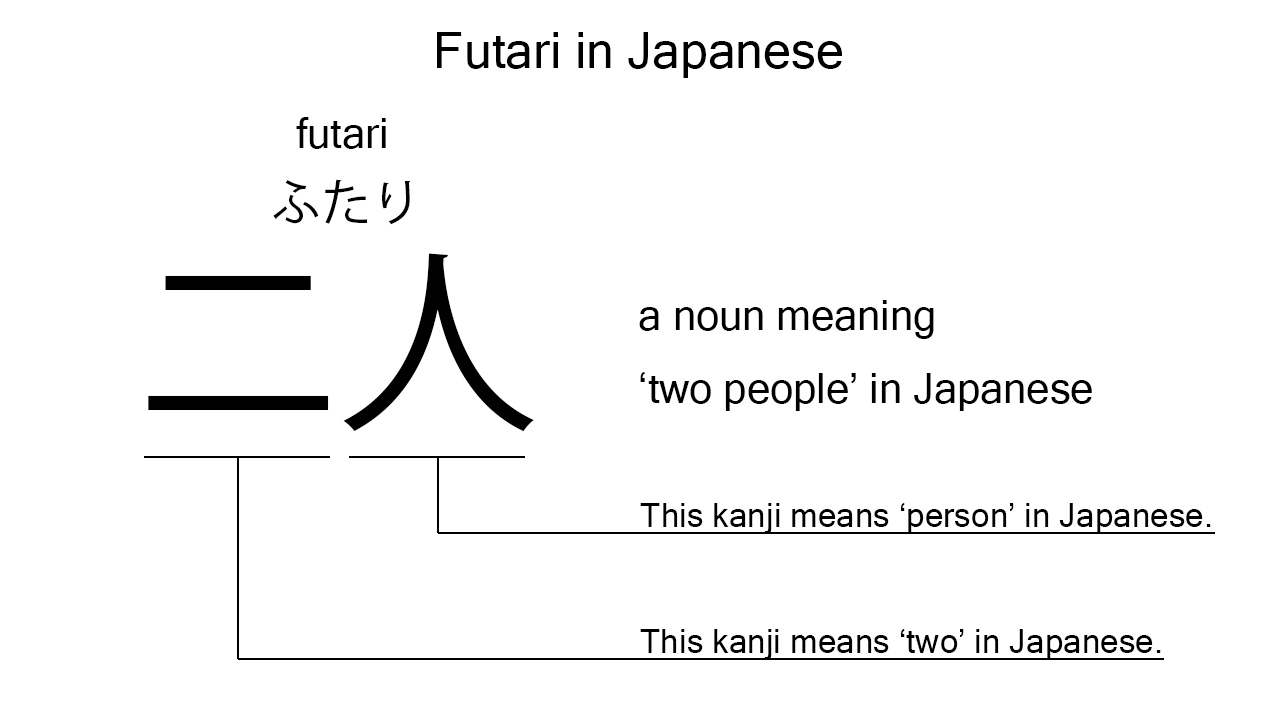What does “futari” mean in Japanese?
Native speakers say “futari” to mean ‘two people’ in Japanese. Perhaps, some Japanese learners know this word as it is sometimes used in Japanese conversations. In this blog post, however, I will explain it in detail based on its kanji expression. And also, I will explain how to use it through example sentences. My explanations would help Japanese learners understand “futari” more clearly. Then, let’s get started!
Contents
Definition and meaning of “futari”
Let me start with the definition and meaning of “futari”.
- futari – 二人 (ふたり) : a noun meaning ‘two people’ in Japanese.
Japanese people use this noun to refer to two people. It’s also worth mentioning here that this can also mean ‘you and I’, ‘you and me’, or such depending on the context and situation. Later, I will explain how to use “futari” to mean ‘you and me’ through an example sentence.
The definition and meaning are simple and clear. To understand this noun more clearly, however, let me explain its kanji characters in detail, one by one.
What does “futari” literally mean in Japanese?
The kanji expression of “futari” consists of the following two kanji characters:
- 二 : a kanji character widely used as a numeral to mean ‘two’ in Japanese.
- 人 : a kanji character widely used to mean ‘person’ in Japanese.
These two kanji characters tell us that “futari” literally means ‘two people’ in Japanese. What the kanji characters express is completely in line with the actual meaning.

When we meet new kanji expressions, we should check their kanji characters in detail to understand their meanings clearly and deeply. In many cases, kanji characters tell us a lot about the meanings of the expressions they form. Actually, here, we could get the better understanding of “futari” through the detailed kanji check above.
So far, I’ve explained the definition and meaning of “futari” together with its kanji characters. Then, let me explain how to use it through the example sentences below.
Example #1: how to say “two people” in Japanese
ano heya ni futari i masu – あの部屋に二人います (あのへやにふたりいます)
There are two people in that room.
Below are the new words used in the example sentence.
- ano – あの : a determiner used before a noun which refers to something not close to the speaker. In the example, this is used before “heya” to say “that room” in Japanese.
- heya – 部屋 (へや) : a noun meaning ‘room’ in Japanese. This can also work as plural. Learn more about Japanese plural.
- ni – に : a case particle used to say where someone or something is. In the example, this is used after “ano heya” to say where two people are.
- i – い : one conjugation of the verb, “iru“, which means ‘to be’ or ‘to present’ in Japanese. In the example, it has been conjugated for the better connection with its following word.
- masu – ます : an auxiliary verb used after a verb to make it polite. Probably, this is well known as a part of Japanese masu form. In the example, this is used after “i” to make it sound polite.
This is a typical usage of “futari”. When we want to say “two people” in Japanese, this noun is always a very good option.
Example #2: another usage of “futari”
kore wa futari no himitsu desu – これは二人の秘密です (これはふたりのひみつです)
This is a secret between you and me.
Below are the new words used in the example sentence.
- kore – これ : a demonstrative pronoun meaning ‘this’ in Japanese.
- wa – は : a binding particle working as a case marker or topic marker. In the example, this works after “kore” to make the subject in the sentence.
- no – の : a case particle used to join two nouns. Normally, the first noun can work as a modifier to describe the second. In the example, this is used to join “futari” and “himitsu”. The formed phrase literally means ‘a secret between two people’ in Japanese. In this example, it has been translated as ‘a secret between you and me’ though. Word orders in Japanese and English are different, but the role of this case particle is similar to those of some English prepositions.
- himitsu – 秘密 (ひみつ) : a noun meaning ‘secret’ in Japanese. This can also work as plural.
- desu – です : an auxiliary verb used after a noun or adjective to make it polite. Probably, this is well known as a part of Japanese desu form. In the example, this is used after the noun phrase, “futari no himitsu”, to make it sound polite.
This is another typical usage of “futari”. In this example, it works to mean ‘you and me’ in Japanese. When it is used in a conversation between only two people, it can mean ‘you and I’, ‘you and me’, ‘us’, or such in Japanese. It’s worth knowing.
Summary
In this blog post, I’ve explained the definition and meaning of “futari” in detail based on its kanji expression. And also, I’ve explained how to use it through the example sentences. Let me summarize them as follows.
- futari – 二人 (ふたり) : a noun meaning ‘two people’ in Japanese. These two kanji characters literally mean ‘two people’ in Japanese. What the kanji characters express is, therefore, completely in line with the actual meaning. It’s also worth mentioning here that this can also mean ‘you and I’, ‘you and me’, or such depending on the context and situation.
Hope my explanations are understandable and helpful for Japanese learners.